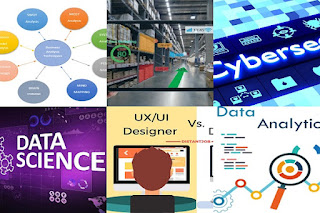As the world is fast transmogrifying into a tech-driven world, people are looking for hands-on IT skills to do to earn extra income.
•Business Analysis — Business analysis is a professional discipline focused on identifying business needs and determining solutions to business problems.
•AR — Augmented reality (AR) is an interactive experience that combines the real world and computer-generated content. The content can span multiple sensory modalities, including visual, auditory, haptic, somatosensory and olfactory.[1] AR can be defined as a system that incorporates three basic features: a combination of real and virtual worlds, real-time interaction, and accurate 3D registration of virtual and real objects.
•Blockchain — Blockchain technology is an advanced database mechanism that allows transparent information sharing within a business network. A blockchain database stores data in blocks that are linked together in a chain.
•Cybersecurity — Computer security, cybersecurity (cyber security), or information technology security (IT security) is the protection of computer systems and networks from attack by malicious actors that may result in unauthorized information disclosure, theft of, or damage to hardware, software, or data, as well as from the disruption or misdirection of the services they provide.
•Cloud Computing — Cloud computing is the on-demand availability of computer system resources, especially data storage (cloud storage) and computing power, without direct active management by the users.
• Data science — Data science is an interdisciplinary academic field that uses statistics, scientific computing, scientific methods, processes, algorithms and systems to extract or extrapolate knowledge and insights from noisy, structured and unstructured data.
• Data Analytics — Data analysis focuses on the process of examining past data through business understanding, data understanding, data preparation, modeling and evaluation, and deployment.
•DevOps — DevOps is a set of practices that combines software development (Dev) and IT operations (Ops). It aims to shorten the systems development life cycle and provide continuous delivery with high software quality.
•Digital Marketing — Digital marketing is the component of marketing that uses the Internet and online-based digital technologies such as desktop computers, mobile phones and other digital media and platforms to promote products and services.
•Internet of Things (IoT) — The Internet of things (IoT) describes physical objects (or groups of such objects) with sensors, processing ability, software and other technologies that connect and exchange data with other devices and systems over the Internet or other communications networks.
•Machine Learning – Machine learning (ML) is a field of inquiry devoted to understanding and building methods that ‘learn’, that is, methods that leverage data to improve performance on some set of tasks.
•Product Management — Product management is the business process of planning, developing, launching, and managing a product or service.
•Project Management – Project management is the process of leading the work of a team to achieve all project goals within the given constraints.
•UX Design — User experience design (UX design, UXD, UED, or XD) is the process of defining the experience a user would go through when interacting with a digital product or website.
•UI Design — User interface (UI) design or user interface engineering is the design of user interfaces for machines and software, such as computers, home appliances, mobile devices, and other electronic devices, with the focus on maximizing usability and the user experience.
•Web & App Development — Web development is the work involved in developing a website for the Internet (World Wide Web) or an intranet (a private network).[
•Software engineering — Software engineering is a systematic engineering approach to software development.


0 comments:
Post a Comment